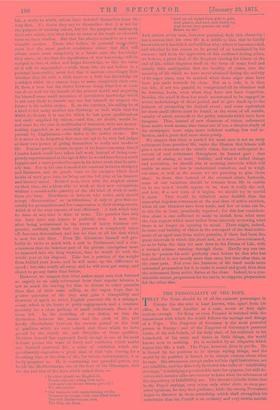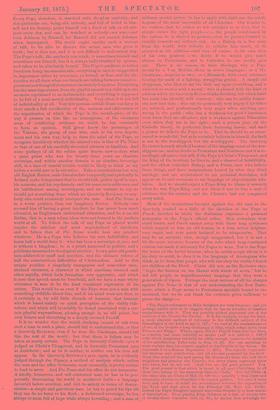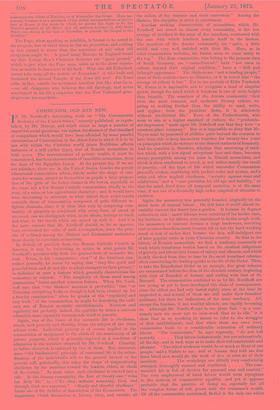THE PERSONALITY OF THE POPE.
THAT Pio Mono should be of all the eminent personages in Europe the one who is least known, who, apart from his office, is the least familiar as a man, seems at first sight curious enough. No King or even Premier is watched with the minuteness with which the world follows the sayings and doings of a Pope. The Emperor of Germany is the most powerful person in Europe ; and of the Emperor of Germany's personal views, of his real beliefs, of his daily chat, of his relations to his household, of his ways and tastes in little things, the world knows next to nothing. He is secluded by an etiquette which fences him like a wall. The Pope, however, lives in public. He is forced by his position to be always saying things, and the world by its position is forced to be always curious about_what he says. His utterances, except under eefeatin rigid limitations, are not infallible, and the Quarterly Reviewer who talks of "infallibility at romps," is indulging a questionable taste for epigram, but still de- votees and enemies alike are curious to learn what the utterances of the depository of Infallibility are. The devout Catholic trusts that in the Pope's sayings, even when only obiter dicta, or even per- sonal opinions, he may find guidance, while the strong Protestant hopes to discover in them something which shall strengthen his conviction that the Pontiff is an ordinary and very unwise mortal
Every Pope, therefore, is watched with sleepless curiosity, and this particular one, being old, unlucky, and full of belief in him- self and his destiny, pours himself out a flood of talk on all sub- jects every day, and can be watched as nobody ever was,—not even Johnson by Boswell, for Boswell did not record Johnson when unprepared. The world ought, amidst such a torrent of talk, to be able to discern the actual man who gives it forth ; but it does not, and it is not difficult to understand why. The Pope's talk, like anybody else's talk, is sometimes himself and sometimes not himself, but it is always individualised by opinion, and taken to be absolutely himself. The Pope's qualities, or rather functions being incommunicable, everything he says is exaggerated in importance either by reverence, or hatred, or fear, and the dis- tinction we all draw when our friends are talking between casual ex- pressions and thoughtf ul utterances is entirely forgotten. Everything has the same importance, from the playful remark to a child up to the sarcastic reprimand to an ambassador, and everything is supposed to be full of a semi-sacred individuality. Very often it is not full of individuality at all. Very few persons outside Rome can keep in their minds a full recollection of the vastness and elaboration of the organisation of which the Pope is the mouth-piece, of the way it presses on him like an atmosphere, of the enormous mass of conflicting evidence on which he has constantly to form an opinion. Still ewer know the personages of the Vatican, the group of men who, each in his own depart- ment and his own way, help to form the mind of the Pope, or recognise intuitively whether the uttered voice is that of Pio Nono or that of one of his carefully shrouded advisers or familiars. And none perhaps of all the critics quite knows now-a-days what a quiet priest who was for twenty-three years an absolute sovereign, and within another domain is an absolute Sovereign still, in a time of mental trouble would be likely to think or say before a world sure to be attentive. Take a conscientious but very old English Rector, make him absolute temporallyand spiritually in Ireland, make it important that he should talk, gather up all he says, his sermons, and his reprimands, and his answers to addresses, and his babblement among worshippers, and we venture to say we should get something from which no Quarterly Reviewer or any- body else could accurately interpret the man. And Pio Nono is in a worse position than our imaginary Rector. Nobody ever accused him of having a great intellect, he has never been much educated, as Englishmen understand education, and he is an old Italian, that is, a man whose ideas were not formed in the modern world at all. To follow the talk of any Pope so placed would require the subtlest and most unprejudiced of intellects, and to follow that of Pio Nono would beat any intellect whatever. He is a Pope who believes his own Infallibility, and hears half a world deny it ; who has been a sovereign de jure, and is without a kingdom ; he is a priest immersed in politics, and a politician immersed in theological niceties ; he is a quiet old gentle- man addicted to snuff and anecdote, and the ultimate referee of half the conscientious difficulties of Christendom. Add to this unique position a singularly transparent and somewhat unre- strained character, a character in which emotions succeed each other rapidly, which feels formalism very oppressive, and which is sure that speech must be beneficial, and we have a man whose utterance is sure to be the least consistent expression of his nature. This would be so even if the Pope were not a man with something childlike about him, and if his mind were not shot, as it certainly is, by odd little threads of humour, that humour which is based mainly on quick perception of the visibly ridi- culous, and which will invariably be found associated with a cer- tain playful waywardness, pleasing enough in an old priest, but very bizarre and disturbing in a deeply-revered Pontiff.
It is no wonder that the world, studying oceans of talk from such a man in such a place, should fail to understand:him, or that a Quarterly Reviewer, even if he were Mr. Gladstone, should fail like the rest of the world ; but that there is failure may be taken as nearly certain. The Pope in fervently Catholic eyes is judged as Christ's Vicegerent, and in fervently Protestant eyes as Antichrist ; and as he is neither, in neither can his true self appear. In the Quarterly Reviewer's eyes, again, he is evidently judged through the Papacy, a method of analysis which, unless the man and the office harmonise most unusually, is pretty certain to lead to error. And Pio Nono and his office do not harmonise. A kindly, humorous, and self-contented man, he has to be per- petually denouncing the world in mediaeval. Latin— a language invented before courtesy, and rich to satiety in terms of denun- ciation—a simple and garrulous man, he has to guard his lips till they can do no harm to his flock ; a dethroned sovereign, he has always to seem full of hope while always bewailing ; and a man of
ordinary mental power, he has to apply with rigid care the subtle dogmas of the most inexorable of all Churches. Our wonder is, we confess, that he makes so few mistakes as he does, that he always curses the right people—i e., the people condemned by the system he is elected to protect—that he presses forward so steadily towards any defined end. As a Bishop in a See away from the world, with nobody to criticise him much, or be annoyed at his oddities—and this, of course, is his own view of his own position — we doubt if he would give much offence to Protestants, and to Catholics he can hardly give any. There is no reason, in their theology, why a Pope should be a Von Moltke, silent in seven languages ; or a Mr.
Gladstone, eloquent in two ; or a Bismarck, with every utterance bearing the mark of a fighting, struggling genius. A simple old clergyman, who likes to say his little say upon everything, and is addicted to stories with a moral ; who is pleased with the kind of address which the Quarterly Review thinks shocking, but which habit has made him identify with courtesy ; who can be mildly humor- ous now and then ; who can be personally very angry if his tithes are refused, and professionally very angry when anything goes wrong in the parish ; who has a weakness for good Churchmen even when they are offenders, and a weakness against Dissenters even when they are in the right ; such a person play, on the Catholic theory, be protected from decreeing heresy, and such a person we believe the Pope to be. That he should be so rever- enced is wonderful, but as he certainly believes in himself, the fault is not in the worshipped, but the worshippers. The Quarterly Reviewer is much shocked because of the language some of the wor- shippers use, and no doubt to Protestant and Northern ears it is ex- ceedingly offensive ; but still, if the Pope is Christ's Vicegerent, and the King of the territory he lives in, and a channel of Infallibility,.
and the oldest orthodox Bishop, and a Priest, men who believe those things, and have imaginations heated by what they think sacrilege, and are accustomed to use technical floridities, will appear on formal occasions to use language of objectionable adu- lation. And we should expect a Pope-King to blame it severely when he was Pope-King, and not when it was to him a sort of evidence that his enemies and the Church's had not conquered every mind.
Most of the accusations brought against the old man in the Quarterly remind us a little of the sketches of the Pope in Punch, sketches in which the draftsman expresses a personal annoyance at the Pope's official robes. Men nowadays wear short tunics, and Punch cannot away with those long petticoats which suggest to him an old woman in a fuss, rather helpless, very angry, and very much inclined to be vituperative. That. may be an accurate view, though exaggerated, but it is not a. bit the more accurate because of the robe which long-continued custom has made it necessary for Popes to wear. Nor is the Pope the worse or the better because, when he scolds people whom it is- his duty to scold, he does it in the language of theologians who think, as he does, that people who will not obey the visible Church are children of the Devil. Christ did not, as the Reviewer says, "begin the Sermon on the Mount with words of scorn," but he did tell people in unparliamentary language that they were a generation of vipers. Perhaps the most serious of all the charges against Pio Nono is that of not understanding the New Testa- ment, which a Pope seems to Protestants specially bound to un- derstand, but we do not think the evidence giiren sufficient to prove the charge :—
" The Pope's references to Holy Scripture are very frequent ; and yet perhaps hardly such as to suggest that he has an accurate or familiar acquaintance with it. They are possibly picked piecemeal out of the services of the Church for the day. It is, for example, to say the least, a most singular method of reference to the difficult subject of the Genealogies of our Lord to say (i. 127), ' we read at the commencement of two of the Gospels a long Genealogy of Him, which comes down from Princes and Kings.' Where, again, did the Pontiff loam that the Jews,. as a nation, had some celebrity as smiths (nell' arte fabbrile, i. 169)7 with which imaginary celebrity he oddly enough connects the mention of the antediluvian Tubal-cain in Gen. iv. 22. Nor can anything be more curious than his exegesis applied to the Parable of the Sower. He expounds it to a Roman Deputation (i. 335). The wayside represents the impious and unbelievers, and all who are possessed by the devil those who received the seed among the thorns are those who rob their neighbour and plunder the Church; the stony places represent those who know, but do not act. And who are the good ground ? You The good ground is that which is found in all good Christians, in all those who belong to the numerous Catholic Clubs.' Now the Clubs en the other side are Clubs of Hell (ii. 420 In's); sanctity is thus (here and commonly elsewhere) identified with certain politics. Nor does it seem very easy to trace in detail the resemblance between the exposition of the Vicar and that given by the Principal (St. Matt. xiii. 18-23). Indeed the Papal Exegesis appears somewhat frequenlly to bear marks of dormitation. Thus, placing Bing Solomon at a date of twenty-two. or twenty-three centuries back (ii. 32), he makes that sovereign the
contemporary either of Pericles, or of Alexander the Great. More im- portant, because it is a specimen of the wilful interpretations so preva- lent at Rome, is the mode in which he proves his right to be the Teacher-general of all States and all nations, because (ii. 456) Saint Peter was chosen in the case of Cornelius, to preach the Gospel to the Gentiles."
The Pope, when speaking as infallible, is bound to be sound in his exegesis, but at other times he has no protection, and nothing in this extract is worse than the utterance of any other old clergyman might be. A good many Bishops in England would say that Young Men's Christian Societies are "good ground," which is just what the Pope says, while as to the Jews' reputa- tion as smiths he has a text at his back. Why else did Nebuchad- nezzar take away all the smiths of Jerusalem? or who built and furnished the second Temple, if the Jews did not? Pio Nono talks, in fact, outside his sacrosanct function just like what he is, —an old clergyman who believes the old theology, and never entertained in his life a suspicion that the New Testament gene- alogies are irreconcilable.








































 Previous page
Previous page